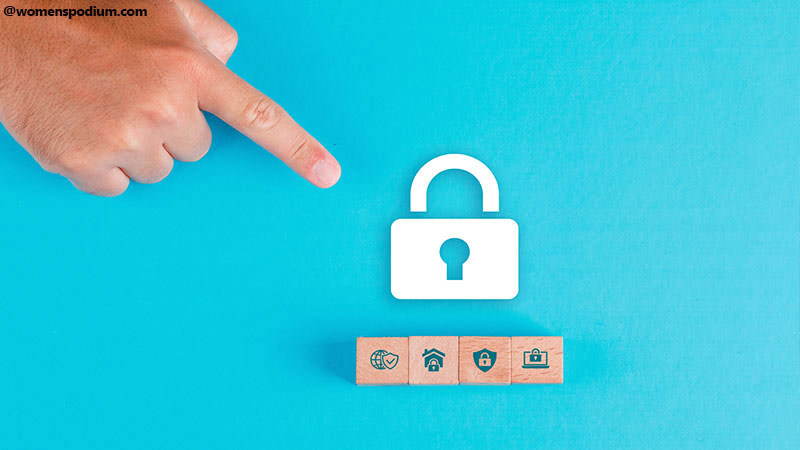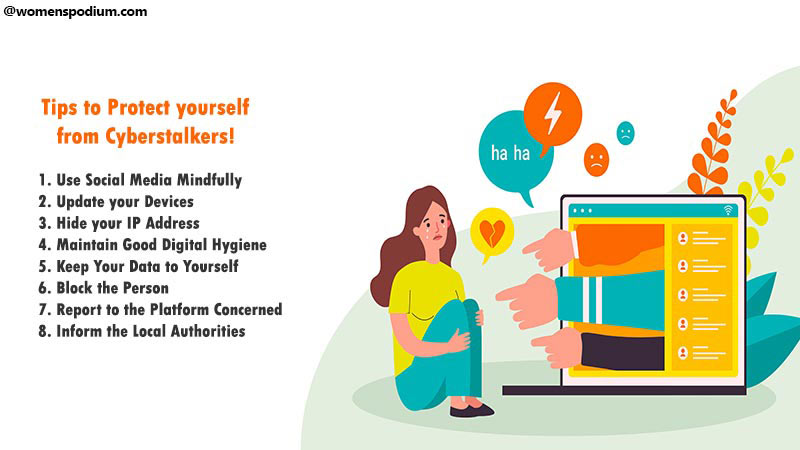
As the world moves into a virtual space, we find ourselves threatened by newer dangers every step of the way. The 2020 pandemic and the subsequent lockdowns that ensued all over the world definitely exposed us to the realm of technology like never before. We were working from home, connecting to people only through the virtual medium. As much as technology has proven to be a boon, it has its downsides. And the worst enemy of anyone online, especially marginalized communities, is cyberstalking. Knowing about ‘what is cyberstalking’ is a must for everyone; let’s dig into it more.
Cyberstalking Definition || What is Cyberstalking?

According to the Wikipedia page on cyberstalking, ‘Cyberstalking is the use of the Internet or other electronic means to stalk or harass any individual, group, or organization. It may include false accusations, defamation, slander, and libel. It may also include monitoring, identity theft, threats, vandalism, solicitation for sex, doxing, or blackmail.’
Cyberstalking and the COVID – 19 Pandemic

So we know then that cyberstalking is an umbrella term for a wide variety of activities carried out through electronic communication that cause harm and trouble to the victim. With the advent of the internet and social media, stalkers have more accessibility than ever, and cyberstalking cases are only ever increasing. Several kinds of research have shown that the amount of cyberstalking faced by people across ages has increased during the COVID – 19 Pandemic. So, what can we do?
How to Deal with Cyberstalking?

The first step to dealing with any online harassment is understanding it, looking out for it, and preventing it. There might be a number of people who could possibly cyber-stalk you. This can include strangers, ex-partners, vindictive friends or acquaintances, anonymous groups of people, etc. You might be stalked based on your gender, demographics, ethnicity, social status or anything else. There are different kinds of cyberstalking practices that go on in the online space. Some of these are as follows :
Catfishing
Catfishing is the practice of creating fake social media profiles to troll, harass, stalk, or catcall someone online. These profiles can be annoying, irritating, to downright debilitating if not appropriately handled.
- Location-based cyberstalking: to an experienced hacker, finding out your location is a piece of cake, and once they do so, they might start troubling you in the physical space as well.
- Hijacking: This works when someone hijacks your webcam or device camera. They might do this by infecting your computer with malware to gain access to your device. Installing stalkerware or other malicious software into your device to gain access is a tactic long used by Cyberstalkers.
- Blackmailing, bullying or trolling: This is perhaps the most well-known form of cyberstalking. Posting hateful comments under every post, blackmailing someone or threatening to disrupt their privacy, trolling someone’s character – all these are forms of cyberstalking that people undergo on a regular basis.
Cyber Harassment

Along with cyberstalking, there is an extensive form of cybercrime known as cyber harassment. This involves a lot of activities intended to harass the victim. Cyber trafficking, smuggling, online racism, sexism, trolling, financial bullying, etc., all amount to cyber harassment.
How to Report Cyberstalking?

Cyberstalking is a form of cyber harassment, and all countries in the world are trying to navigate this wave of cybercrimes after the surge in online activity post-pandemic. The laws surrounding cyber harassment differ in every country, and therefore, the procedure to report a cybercrime varies based on your legal structure. Some countries have sturdy data protection laws, and therefore it is easier to stop cyber crimes and report them in such countries. However, in some other countries, cyber laws are not as strong, and therefore, it becomes difficult to report cyberstalking. Consequently, you must be aware of the cyber laws in your country and, specifically, for your region and demographic. Knowing the laws and legal authorities, you can approach in case of a cyberattack; furthermore allows you to prepare yourself and deal with cybercrimes more responsibly.
Also Read: Cyberstalking and cyberbullying are one of the many social issues that trouble future minds. There must be some legal measures to ensure that everyone is safe.
How to Stop/Prevent Cyberstalking – Some Handy Tips
Though cyberstalking is never the victim’s fault, one can take some steps to ensure that we are safe on the internet.
1. Use Social Media Mindfully

While this might not always be possible, try to be highly mindful of the content that you put out on social media or the internet at large. Beware of sharing too many details about your personal life or details such as your current location or place of residence. It is important to understand that while most people will watch your content in a good light, there can be a stalker lurking who can make the most out of every piece of information you provide to them. Therefore, make use of techniques like posting one or two days after events take place, not posting too many intimate details about your life, not exposing minors through your account, etc.
2. Update Your Devices

Most devices come with built-in update features that allow you to update your devices occasionally. While doing so, be sure to check for any extra files or apps that may have entered your device. Updating software periodically allows you to prevent information leaks, and the companies making this software always try to ensure that they patch their security gaps with every update.
3. Hide Your IP Address

There are a variety of tools available to allow you to hide your IP address. Do your research in this area or consult a professional. Your IP address is the roadway to your digital presence, and in this case, you don’t want to make it easy for your stalkers to come at you by revealing your IP address at every communication juncture.
4. Maintain Good Digital Hygiene

It is important that you thoroughly check the privacy policy and settings of any social media platform you engage with, be it Facebook, Twitter, Instagram, online games etc. Ensure that you only use protected and authorized apps that keep you safe from data theft, cyberstalking, cyberbullying, or other cybercrimes.
Even when filling forms or questionnaires on the internet, or shopping online, make sure that you trust the source where it came from. Use only secure browsers and websites, and ensure that you never reveal personal information on such platforms.
5. Keep Your Data to Yourself

Sensitive and private Data like OTPs, passwords, bank details, financial information etc., should never be shared online, even by mistake. The implications of such data falling into the wrong hands can be lethal. Therefore, personal information, images, videos, and any other material needs to be kept confidential at all costs. These are some of the precautions that can help us prevent cyberstalking. But what if you are being cyberstalked already? What should you do then?
What to do if You are Being Cyberstalked?
Firstly, if you are being cyberstalked, don’t panic. Remember, it is not your fault, but you need to take responsibility and ensure that you deal with it sensibly. Here are a few things you can do :
1. Block the Person

If possible, block your stalker from all social media platforms, and remain inactive on such platforms for a few days. This will prevent them from creating any further damage while you resolve the situation at hand.
2. Report to the Platform Concerned

These days every online platform has the facility to report wrongful behaviour that happens online. Take the time to report to the platform concerned and demand corrective action.
3. Inform the Local Authorities

If your city has a data protection cell, approach them and inform them about your cyberattack. If that is not possible, notify the local police about the cybercrimes and try to get help from your national legal system.
Remember, early intervention is a must to deal with cybercrime with more effectively. Therefore, you must inform the authorities and protect yourself at the earliest. If you are someone who is undergoing cyber crimes or cyberstalking, know that you are not alone. Along with the legal aspect of cybercrimes, there is also the psychological aspect. Facing cyber crimes leaves deep scars, and therefore, it is a must that you seek the right kind of support from those around you or even from professionals. And it is time that we, as a society, stand up against cybercrimes and make the internet a safe space for everyone!
Also Read: Nowadays, children are exposed to internet at a very young age. Parents must be aware of what they are doing and take proper measures to ensure internet safety for children.






